Case Study Essay on Unprofessional Conduct in Nursing (HUCL1301)
VerifiedAdded on 2022/10/11
|6
|1395
|13
Essay
AI Summary
This essay analyzes a case study concerning a nurse's unprofessional conduct, specifically focusing on documentation failures and ethical breaches within a healthcare setting. The essay delves into various instances where the nurse failed to uphold core values such as empathy, effective communication, ethical and legal considerations, and professionalism. The analysis explores the negative impact of these actions on different departments, including intensive care, emergency care, biostatistics, medical administration, and plan management. The essay highlights how the nurse's actions hindered patient care, compromised data accuracy, and ultimately discouraged health promotion. The author emphasizes the importance of addressing these unprofessional behaviors to ensure patient safety and the effective functioning of healthcare departments. The essay uses references to support the arguments, emphasizing the importance of professionalism and ethical conduct in nursing practice.
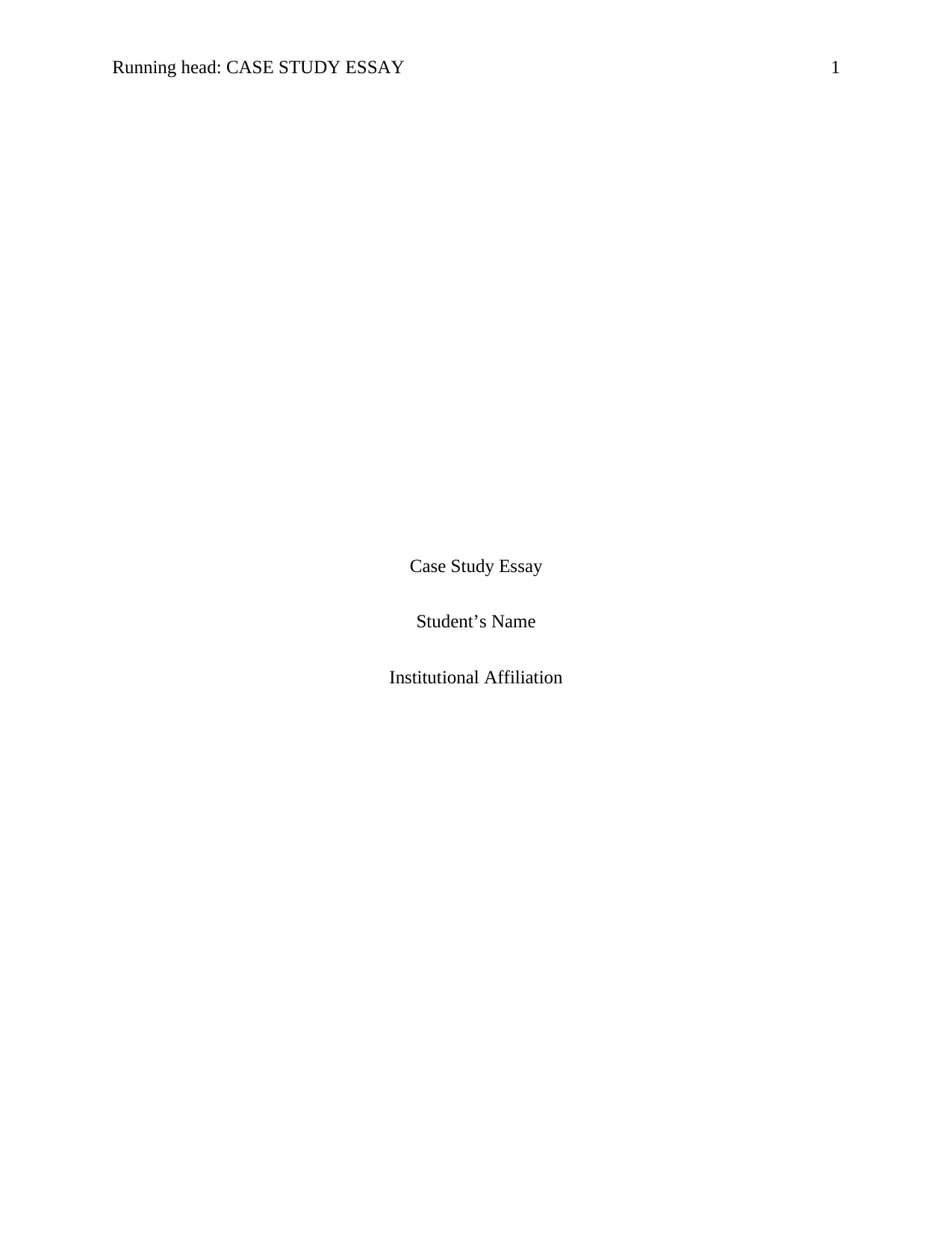
Running head: CASE STUDY ESSAY 1
Case Study Essay
Student’s Name
Institutional Affiliation
Case Study Essay
Student’s Name
Institutional Affiliation
Paraphrase This Document
Need a fresh take? Get an instant paraphrase of this document with our AI Paraphraser
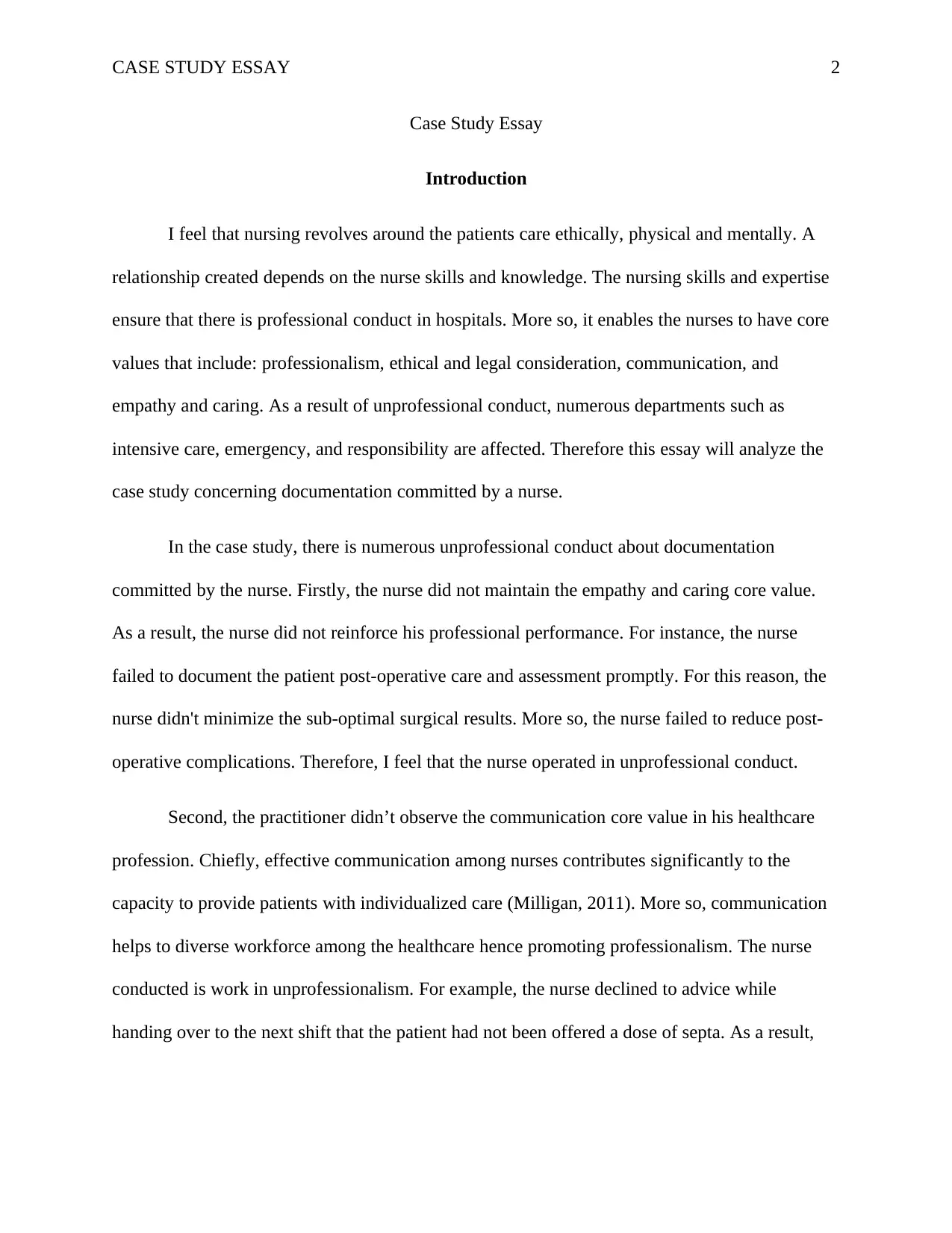
CASE STUDY ESSAY 2
Case Study Essay
Introduction
I feel that nursing revolves around the patients care ethically, physical and mentally. A
relationship created depends on the nurse skills and knowledge. The nursing skills and expertise
ensure that there is professional conduct in hospitals. More so, it enables the nurses to have core
values that include: professionalism, ethical and legal consideration, communication, and
empathy and caring. As a result of unprofessional conduct, numerous departments such as
intensive care, emergency, and responsibility are affected. Therefore this essay will analyze the
case study concerning documentation committed by a nurse.
In the case study, there is numerous unprofessional conduct about documentation
committed by the nurse. Firstly, the nurse did not maintain the empathy and caring core value.
As a result, the nurse did not reinforce his professional performance. For instance, the nurse
failed to document the patient post-operative care and assessment promptly. For this reason, the
nurse didn't minimize the sub-optimal surgical results. More so, the nurse failed to reduce post-
operative complications. Therefore, I feel that the nurse operated in unprofessional conduct.
Second, the practitioner didn’t observe the communication core value in his healthcare
profession. Chiefly, effective communication among nurses contributes significantly to the
capacity to provide patients with individualized care (Milligan, 2011). More so, communication
helps to diverse workforce among the healthcare hence promoting professionalism. The nurse
conducted is work in unprofessionalism. For example, the nurse declined to advice while
handing over to the next shift that the patient had not been offered a dose of septa. As a result,
Case Study Essay
Introduction
I feel that nursing revolves around the patients care ethically, physical and mentally. A
relationship created depends on the nurse skills and knowledge. The nursing skills and expertise
ensure that there is professional conduct in hospitals. More so, it enables the nurses to have core
values that include: professionalism, ethical and legal consideration, communication, and
empathy and caring. As a result of unprofessional conduct, numerous departments such as
intensive care, emergency, and responsibility are affected. Therefore this essay will analyze the
case study concerning documentation committed by a nurse.
In the case study, there is numerous unprofessional conduct about documentation
committed by the nurse. Firstly, the nurse did not maintain the empathy and caring core value.
As a result, the nurse did not reinforce his professional performance. For instance, the nurse
failed to document the patient post-operative care and assessment promptly. For this reason, the
nurse didn't minimize the sub-optimal surgical results. More so, the nurse failed to reduce post-
operative complications. Therefore, I feel that the nurse operated in unprofessional conduct.
Second, the practitioner didn’t observe the communication core value in his healthcare
profession. Chiefly, effective communication among nurses contributes significantly to the
capacity to provide patients with individualized care (Milligan, 2011). More so, communication
helps to diverse workforce among the healthcare hence promoting professionalism. The nurse
conducted is work in unprofessionalism. For example, the nurse declined to advice while
handing over to the next shift that the patient had not been offered a dose of septa. As a result,
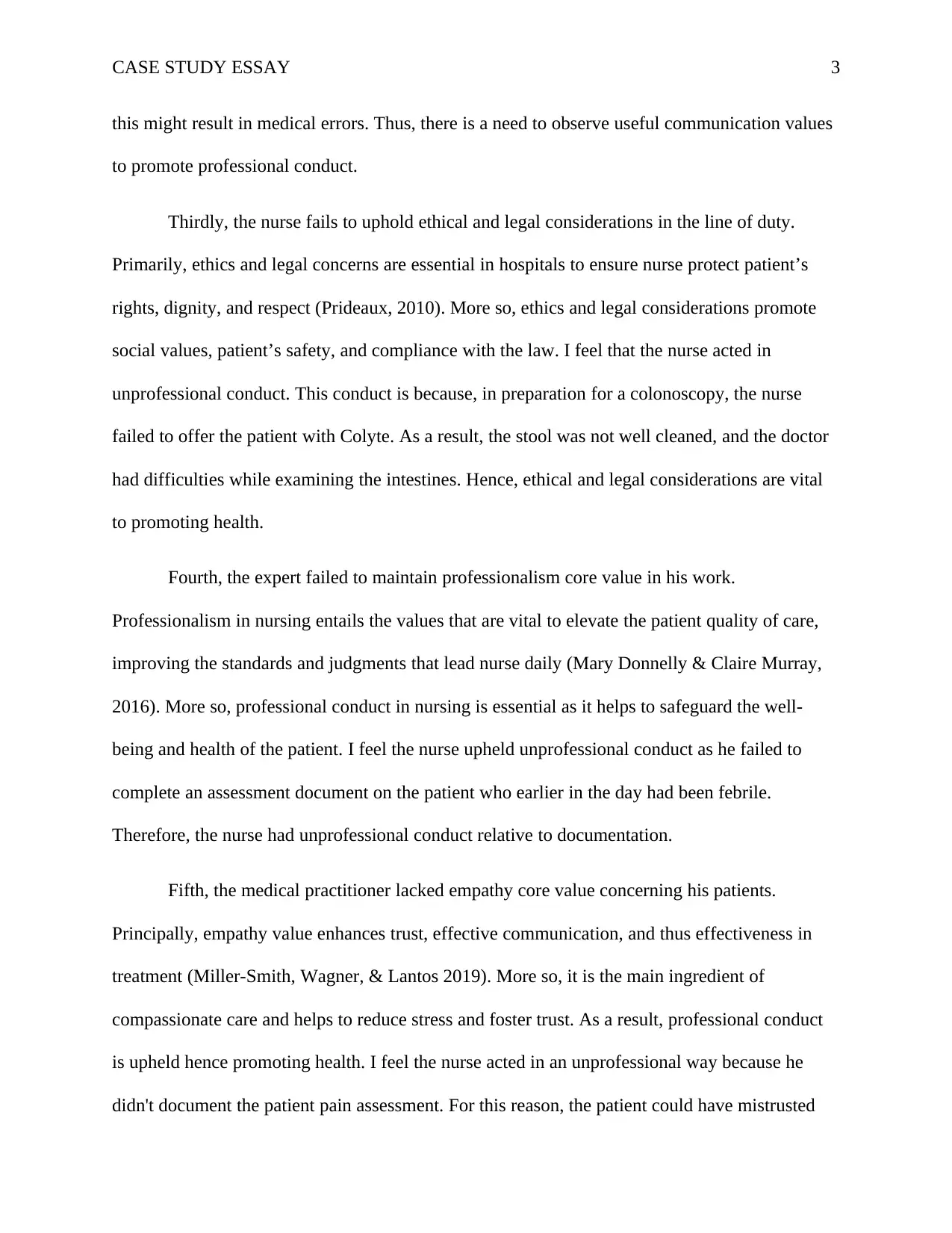
CASE STUDY ESSAY 3
this might result in medical errors. Thus, there is a need to observe useful communication values
to promote professional conduct.
Thirdly, the nurse fails to uphold ethical and legal considerations in the line of duty.
Primarily, ethics and legal concerns are essential in hospitals to ensure nurse protect patient’s
rights, dignity, and respect (Prideaux, 2010). More so, ethics and legal considerations promote
social values, patient’s safety, and compliance with the law. I feel that the nurse acted in
unprofessional conduct. This conduct is because, in preparation for a colonoscopy, the nurse
failed to offer the patient with Colyte. As a result, the stool was not well cleaned, and the doctor
had difficulties while examining the intestines. Hence, ethical and legal considerations are vital
to promoting health.
Fourth, the expert failed to maintain professionalism core value in his work.
Professionalism in nursing entails the values that are vital to elevate the patient quality of care,
improving the standards and judgments that lead nurse daily (Mary Donnelly & Claire Murray,
2016). More so, professional conduct in nursing is essential as it helps to safeguard the well-
being and health of the patient. I feel the nurse upheld unprofessional conduct as he failed to
complete an assessment document on the patient who earlier in the day had been febrile.
Therefore, the nurse had unprofessional conduct relative to documentation.
Fifth, the medical practitioner lacked empathy core value concerning his patients.
Principally, empathy value enhances trust, effective communication, and thus effectiveness in
treatment (Miller-Smith, Wagner, & Lantos 2019). More so, it is the main ingredient of
compassionate care and helps to reduce stress and foster trust. As a result, professional conduct
is upheld hence promoting health. I feel the nurse acted in an unprofessional way because he
didn't document the patient pain assessment. For this reason, the patient could have mistrusted
this might result in medical errors. Thus, there is a need to observe useful communication values
to promote professional conduct.
Thirdly, the nurse fails to uphold ethical and legal considerations in the line of duty.
Primarily, ethics and legal concerns are essential in hospitals to ensure nurse protect patient’s
rights, dignity, and respect (Prideaux, 2010). More so, ethics and legal considerations promote
social values, patient’s safety, and compliance with the law. I feel that the nurse acted in
unprofessional conduct. This conduct is because, in preparation for a colonoscopy, the nurse
failed to offer the patient with Colyte. As a result, the stool was not well cleaned, and the doctor
had difficulties while examining the intestines. Hence, ethical and legal considerations are vital
to promoting health.
Fourth, the expert failed to maintain professionalism core value in his work.
Professionalism in nursing entails the values that are vital to elevate the patient quality of care,
improving the standards and judgments that lead nurse daily (Mary Donnelly & Claire Murray,
2016). More so, professional conduct in nursing is essential as it helps to safeguard the well-
being and health of the patient. I feel the nurse upheld unprofessional conduct as he failed to
complete an assessment document on the patient who earlier in the day had been febrile.
Therefore, the nurse had unprofessional conduct relative to documentation.
Fifth, the medical practitioner lacked empathy core value concerning his patients.
Principally, empathy value enhances trust, effective communication, and thus effectiveness in
treatment (Miller-Smith, Wagner, & Lantos 2019). More so, it is the main ingredient of
compassionate care and helps to reduce stress and foster trust. As a result, professional conduct
is upheld hence promoting health. I feel the nurse acted in an unprofessional way because he
didn't document the patient pain assessment. For this reason, the patient could have mistrusted
⊘ This is a preview!⊘
Do you want full access?
Subscribe today to unlock all pages.

Trusted by 1+ million students worldwide
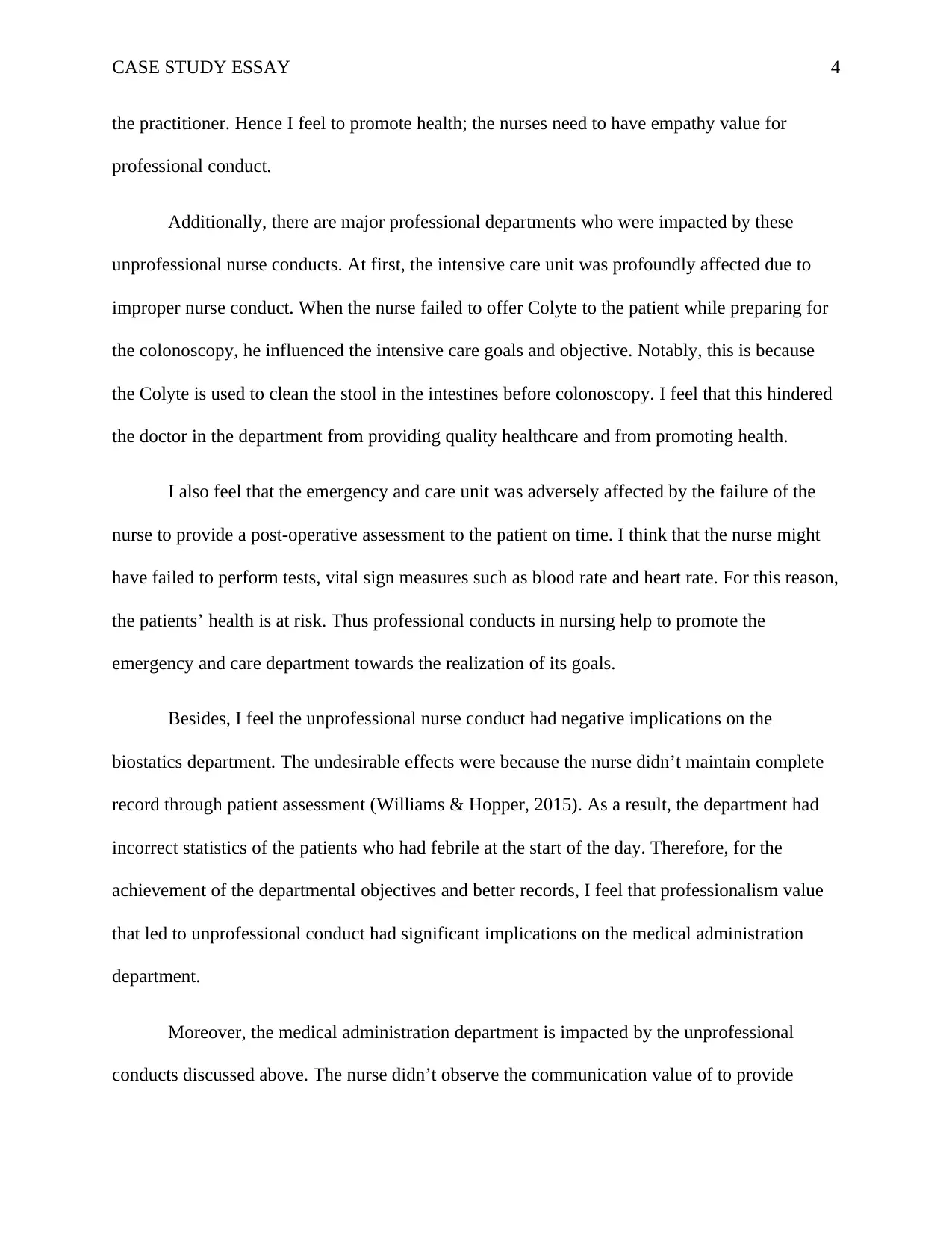
CASE STUDY ESSAY 4
the practitioner. Hence I feel to promote health; the nurses need to have empathy value for
professional conduct.
Additionally, there are major professional departments who were impacted by these
unprofessional nurse conducts. At first, the intensive care unit was profoundly affected due to
improper nurse conduct. When the nurse failed to offer Colyte to the patient while preparing for
the colonoscopy, he influenced the intensive care goals and objective. Notably, this is because
the Colyte is used to clean the stool in the intestines before colonoscopy. I feel that this hindered
the doctor in the department from providing quality healthcare and from promoting health.
I also feel that the emergency and care unit was adversely affected by the failure of the
nurse to provide a post-operative assessment to the patient on time. I think that the nurse might
have failed to perform tests, vital sign measures such as blood rate and heart rate. For this reason,
the patients’ health is at risk. Thus professional conducts in nursing help to promote the
emergency and care department towards the realization of its goals.
Besides, I feel the unprofessional nurse conduct had negative implications on the
biostatics department. The undesirable effects were because the nurse didn’t maintain complete
record through patient assessment (Williams & Hopper, 2015). As a result, the department had
incorrect statistics of the patients who had febrile at the start of the day. Therefore, for the
achievement of the departmental objectives and better records, I feel that professionalism value
that led to unprofessional conduct had significant implications on the medical administration
department.
Moreover, the medical administration department is impacted by the unprofessional
conducts discussed above. The nurse didn’t observe the communication value of to provide
the practitioner. Hence I feel to promote health; the nurses need to have empathy value for
professional conduct.
Additionally, there are major professional departments who were impacted by these
unprofessional nurse conducts. At first, the intensive care unit was profoundly affected due to
improper nurse conduct. When the nurse failed to offer Colyte to the patient while preparing for
the colonoscopy, he influenced the intensive care goals and objective. Notably, this is because
the Colyte is used to clean the stool in the intestines before colonoscopy. I feel that this hindered
the doctor in the department from providing quality healthcare and from promoting health.
I also feel that the emergency and care unit was adversely affected by the failure of the
nurse to provide a post-operative assessment to the patient on time. I think that the nurse might
have failed to perform tests, vital sign measures such as blood rate and heart rate. For this reason,
the patients’ health is at risk. Thus professional conducts in nursing help to promote the
emergency and care department towards the realization of its goals.
Besides, I feel the unprofessional nurse conduct had negative implications on the
biostatics department. The undesirable effects were because the nurse didn’t maintain complete
record through patient assessment (Williams & Hopper, 2015). As a result, the department had
incorrect statistics of the patients who had febrile at the start of the day. Therefore, for the
achievement of the departmental objectives and better records, I feel that professionalism value
that led to unprofessional conduct had significant implications on the medical administration
department.
Moreover, the medical administration department is impacted by the unprofessional
conducts discussed above. The nurse didn’t observe the communication value of to provide
Paraphrase This Document
Need a fresh take? Get an instant paraphrase of this document with our AI Paraphraser
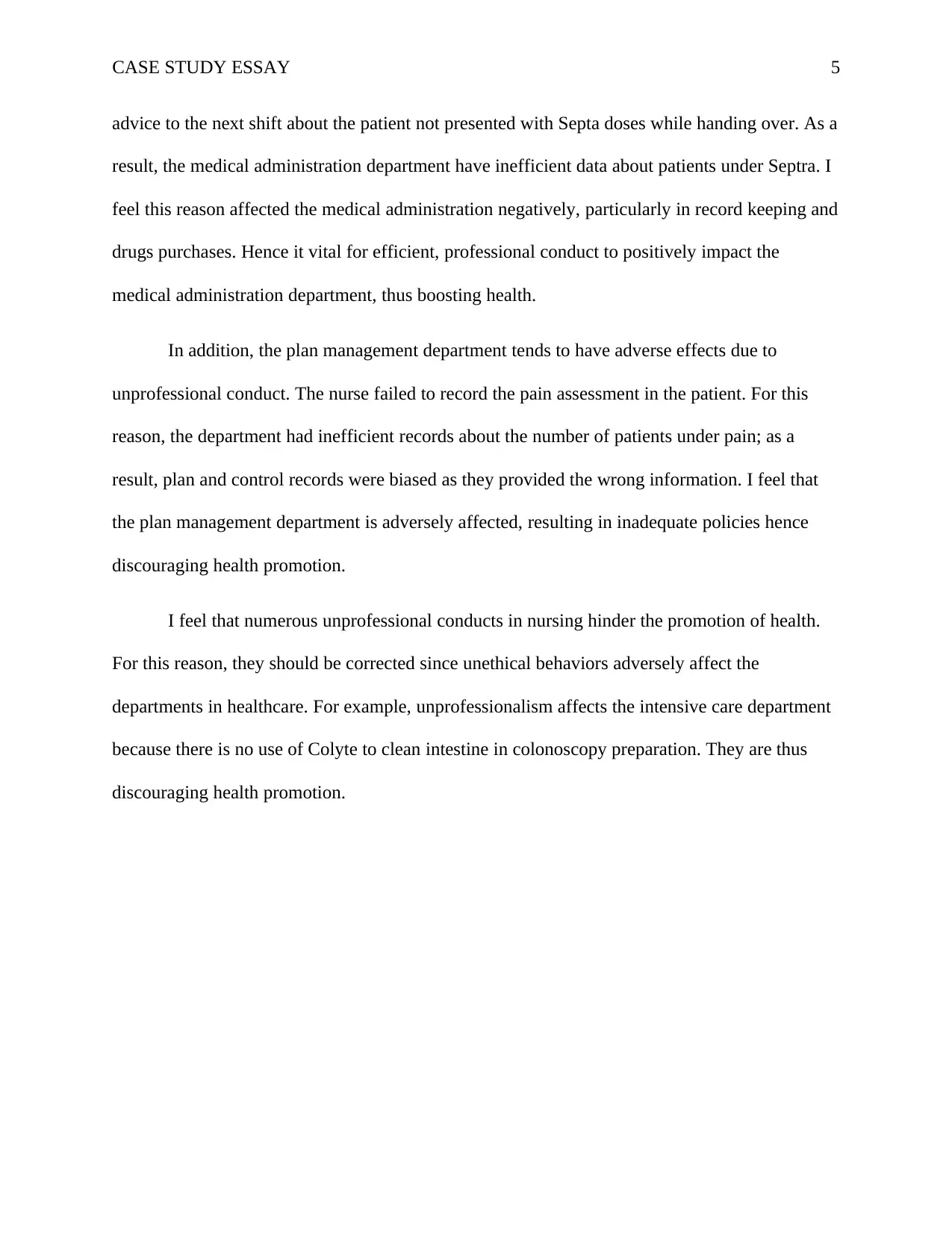
CASE STUDY ESSAY 5
advice to the next shift about the patient not presented with Septa doses while handing over. As a
result, the medical administration department have inefficient data about patients under Septra. I
feel this reason affected the medical administration negatively, particularly in record keeping and
drugs purchases. Hence it vital for efficient, professional conduct to positively impact the
medical administration department, thus boosting health.
In addition, the plan management department tends to have adverse effects due to
unprofessional conduct. The nurse failed to record the pain assessment in the patient. For this
reason, the department had inefficient records about the number of patients under pain; as a
result, plan and control records were biased as they provided the wrong information. I feel that
the plan management department is adversely affected, resulting in inadequate policies hence
discouraging health promotion.
I feel that numerous unprofessional conducts in nursing hinder the promotion of health.
For this reason, they should be corrected since unethical behaviors adversely affect the
departments in healthcare. For example, unprofessionalism affects the intensive care department
because there is no use of Colyte to clean intestine in colonoscopy preparation. They are thus
discouraging health promotion.
advice to the next shift about the patient not presented with Septa doses while handing over. As a
result, the medical administration department have inefficient data about patients under Septra. I
feel this reason affected the medical administration negatively, particularly in record keeping and
drugs purchases. Hence it vital for efficient, professional conduct to positively impact the
medical administration department, thus boosting health.
In addition, the plan management department tends to have adverse effects due to
unprofessional conduct. The nurse failed to record the pain assessment in the patient. For this
reason, the department had inefficient records about the number of patients under pain; as a
result, plan and control records were biased as they provided the wrong information. I feel that
the plan management department is adversely affected, resulting in inadequate policies hence
discouraging health promotion.
I feel that numerous unprofessional conducts in nursing hinder the promotion of health.
For this reason, they should be corrected since unethical behaviors adversely affect the
departments in healthcare. For example, unprofessionalism affects the intensive care department
because there is no use of Colyte to clean intestine in colonoscopy preparation. They are thus
discouraging health promotion.
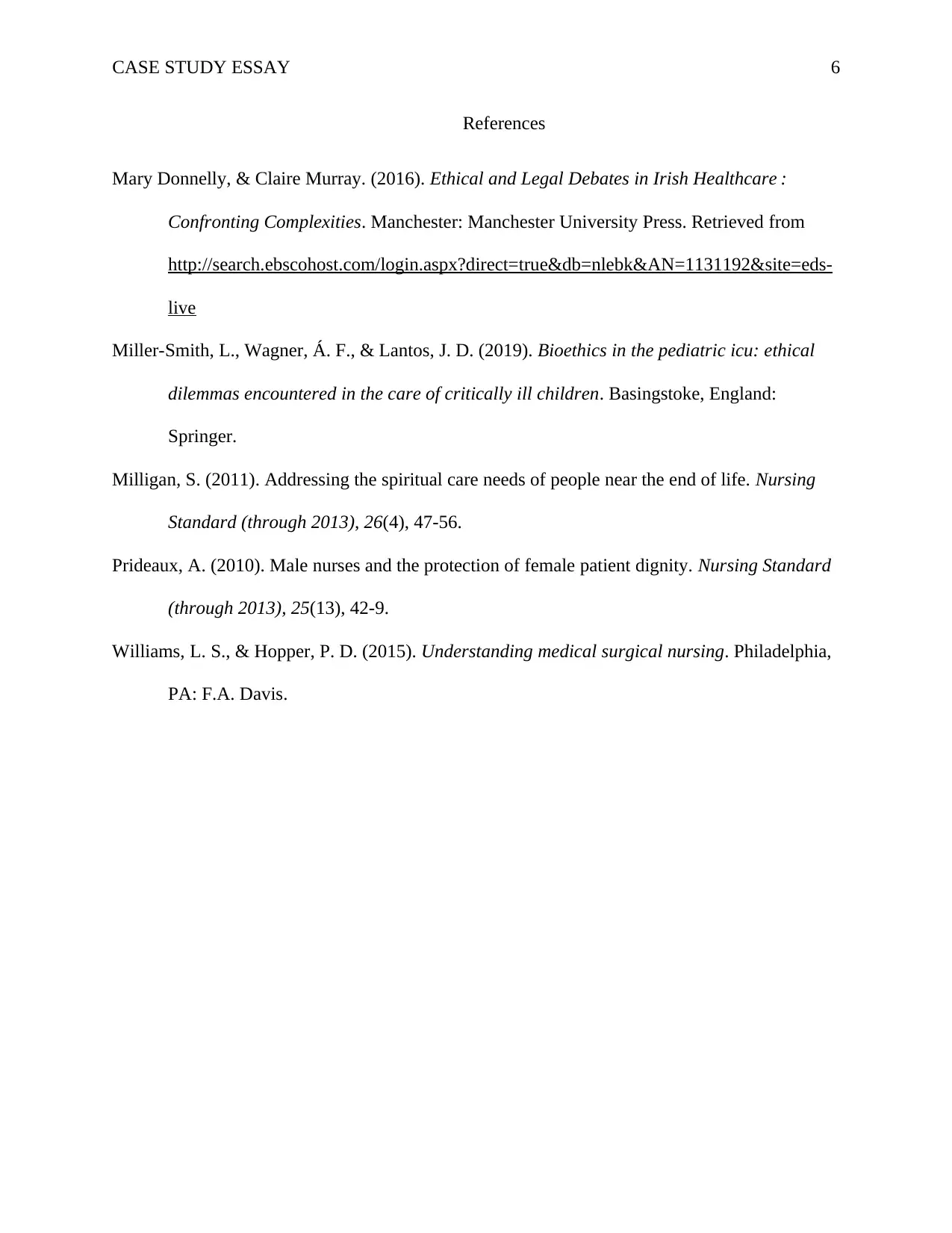
CASE STUDY ESSAY 6
References
Mary Donnelly, & Claire Murray. (2016). Ethical and Legal Debates in Irish Healthcare :
Confronting Complexities. Manchester: Manchester University Press. Retrieved from
http://search.ebscohost.com/login.aspx?direct=true&db=nlebk&AN=1131192&site=eds-
live
Miller-Smith, L., Wagner, Á. F., & Lantos, J. D. (2019). Bioethics in the pediatric icu: ethical
dilemmas encountered in the care of critically ill children. Basingstoke, England:
Springer.
Milligan, S. (2011). Addressing the spiritual care needs of people near the end of life. Nursing
Standard (through 2013), 26(4), 47-56.
Prideaux, A. (2010). Male nurses and the protection of female patient dignity. Nursing Standard
(through 2013), 25(13), 42-9.
Williams, L. S., & Hopper, P. D. (2015). Understanding medical surgical nursing. Philadelphia,
PA: F.A. Davis.
References
Mary Donnelly, & Claire Murray. (2016). Ethical and Legal Debates in Irish Healthcare :
Confronting Complexities. Manchester: Manchester University Press. Retrieved from
http://search.ebscohost.com/login.aspx?direct=true&db=nlebk&AN=1131192&site=eds-
live
Miller-Smith, L., Wagner, Á. F., & Lantos, J. D. (2019). Bioethics in the pediatric icu: ethical
dilemmas encountered in the care of critically ill children. Basingstoke, England:
Springer.
Milligan, S. (2011). Addressing the spiritual care needs of people near the end of life. Nursing
Standard (through 2013), 26(4), 47-56.
Prideaux, A. (2010). Male nurses and the protection of female patient dignity. Nursing Standard
(through 2013), 25(13), 42-9.
Williams, L. S., & Hopper, P. D. (2015). Understanding medical surgical nursing. Philadelphia,
PA: F.A. Davis.
⊘ This is a preview!⊘
Do you want full access?
Subscribe today to unlock all pages.

Trusted by 1+ million students worldwide
1 out of 6
Related Documents
Your All-in-One AI-Powered Toolkit for Academic Success.
+13062052269
info@desklib.com
Available 24*7 on WhatsApp / Email
![[object Object]](/_next/static/media/star-bottom.7253800d.svg)
Unlock your academic potential
Copyright © 2020–2026 A2Z Services. All Rights Reserved. Developed and managed by ZUCOL.




